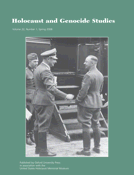-
Views
-
Cite
Cite
István Deák, The Holocaust in Hungary: Sixty Years Later, Randolph L. Braham and Brewster S Chamberlin, eds. (New York: The Rosenthal Institute for Holocaust Studies, Graduate Center of The City University of New York; Boulder, CO: Social Science Monographs in association with the United States Holocaust Memorial Museum, 2006), xxix + 390 pp., $50.00, Holocaust and Genocide Studies, Volume 22, Issue 1, Spring 2008, Pages 115–117, https://doi.org/10.1093/hgs/dcn006
Close - Share Icon Share
Extract
Randolph Braham has published a third scholarly volume marking the passing of another decade after the Holocaust in Hungary and Transylvania. Each volume, prepared in collaboration with one or another colleague, is a tribute to Braham's staggering achievements: not only is he a great academic organizer, but he has written or edited at least forty-five books and hundreds of essays. His many disciples can boast of excellent books themselves despite the fact that—as the historian Radu Ioanid and the archival specialist Ferenc Katona of the United States Holocaust Memorial Museum complain in this volume—many original documents remain unavailable to this day. Such documents have either fallen victim to the ravages of time or (Ioanid and Katona suspect) were deliberately destroyed. Possibly some are being withheld due to their incriminating contents.
Authors representing several generations and countries contributed the twenty-one essays in this volume. Encouragingly, some of the younger writers are not of Hungarian background, though several speak and write impeccable Hungarian. The volume is the result of two consecutive conferences in 2004; one in Washington, the other in Budapest. The keynote addresses, reproduced in the book, were provided by Elie Wiesel and Randolph Braham, both Transylvanian victims of the German-Hungarian effort in 1944 to rid Hungary of its 800,000 Jews. Wiesel was deported to Auschwitz; Braham was drafted into forced labor for the Hungarian military. Both survived because by that time neither Germany nor Hungary could completely dispense with the forced labor of the remaining healthy Jews.




